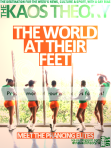The Last Match
Warning: This article contains spoilers that some readers may prefer to avoid.
 Director Antonio Hens' picture - the festival's midpoint gala - came with high expectations, and it doesn't disappoint. This is a love story about something; too often, gay cinema isn't about anything much at all.
Director Antonio Hens' picture - the festival's midpoint gala - came with high expectations, and it doesn't disappoint. This is a love story about something; too often, gay cinema isn't about anything much at all. "Rey and Yovsani are two young men trying to get by as best they can in contemporary Havana: one uses his physical charms to make money as a rent boy for rich tourists, the other works for his girlfriend’s father selling a wide range of clothing and general goods but dreams of escape. They meet on the slum football ground where they regularly play; and a chance encounter at a cruising ground shows to each their hitherto nonrevealed sexuality. A passionate affair ensues. They both have girlfriends and rely heavily on family members for help with the basics (home comfort, food and affection) but their focus increasingly and dangerously becomes each other. Rey feels emboldened by easy money and splashes out on clothes but gambling drives him deep into debt. An increasingly desperate search for money makes them both take risks. When Rey is scouted for a major football team he jeopardises everything by continuing to indulge in late-night activities."
"Rey and Yovsani are two young men trying to get by as best they can in contemporary Havana: one uses his physical charms to make money as a rent boy for rich tourists, the other works for his girlfriend’s father selling a wide range of clothing and general goods but dreams of escape. They meet on the slum football ground where they regularly play; and a chance encounter at a cruising ground shows to each their hitherto nonrevealed sexuality. A passionate affair ensues. They both have girlfriends and rely heavily on family members for help with the basics (home comfort, food and affection) but their focus increasingly and dangerously becomes each other. Rey feels emboldened by easy money and splashes out on clothes but gambling drives him deep into debt. An increasingly desperate search for money makes them both take risks. When Rey is scouted for a major football team he jeopardises everything by continuing to indulge in late-night activities."The Last Match reminded me of Midnight Dancers (Philippines, 1994) which also follows the lives of young men put out to stud by their impoverished families. Hens' Havanna tale unfortunately also shares the dispiriting trajectory of that picture: Rey and Yovsani's love story ends in tragedy. Similar fates befall the Romeos in Cal, and Children of God; it isn't enough that these young gay men have to suffer through the movie: they must also pay the ultimate price. Killing your leading lady (as it were) might look like an impressive sacrifice on the altar of realism by filmmakers seeking to avoid a fairytale ending, but for the audience, it's often a kick in the teeth.
It's a real shame, because until the disappointing finale, The Last Match doesn't miss a beat.
 Antonio Hens had been due to appear for a Q&A at Tuesday's screening with his two young stars (Milton García and Reinier Díaz), but visa problems scuppered that. Instead, programmer Brian Robinson spoke to them over Skype, with Hens translating for the boys. Unfortunately, they had to endure such blistering questions from the audience as "why did you not hire gay actors instead?" There'd be equally moronic questions asked by gay men at Age of Consent the following day. Thank God for lesbians.
Antonio Hens had been due to appear for a Q&A at Tuesday's screening with his two young stars (Milton García and Reinier Díaz), but visa problems scuppered that. Instead, programmer Brian Robinson spoke to them over Skype, with Hens translating for the boys. Unfortunately, they had to endure such blistering questions from the audience as "why did you not hire gay actors instead?" There'd be equally moronic questions asked by gay men at Age of Consent the following day. Thank God for lesbians.
Next: Age Of Consent
 Antonio Hens had been due to appear for a Q&A at Tuesday's screening with his two young stars (Milton García and Reinier Díaz), but visa problems scuppered that. Instead, programmer Brian Robinson spoke to them over Skype, with Hens translating for the boys. Unfortunately, they had to endure such blistering questions from the audience as "why did you not hire gay actors instead?" There'd be equally moronic questions asked by gay men at Age of Consent the following day. Thank God for lesbians.
Antonio Hens had been due to appear for a Q&A at Tuesday's screening with his two young stars (Milton García and Reinier Díaz), but visa problems scuppered that. Instead, programmer Brian Robinson spoke to them over Skype, with Hens translating for the boys. Unfortunately, they had to endure such blistering questions from the audience as "why did you not hire gay actors instead?" There'd be equally moronic questions asked by gay men at Age of Consent the following day. Thank God for lesbians.Next: Age Of Consent
More from kaos at BFI Flare.














.webp)



.jpg)


.jpg)
































































































































































































































































































































0 comments:
Post a Comment